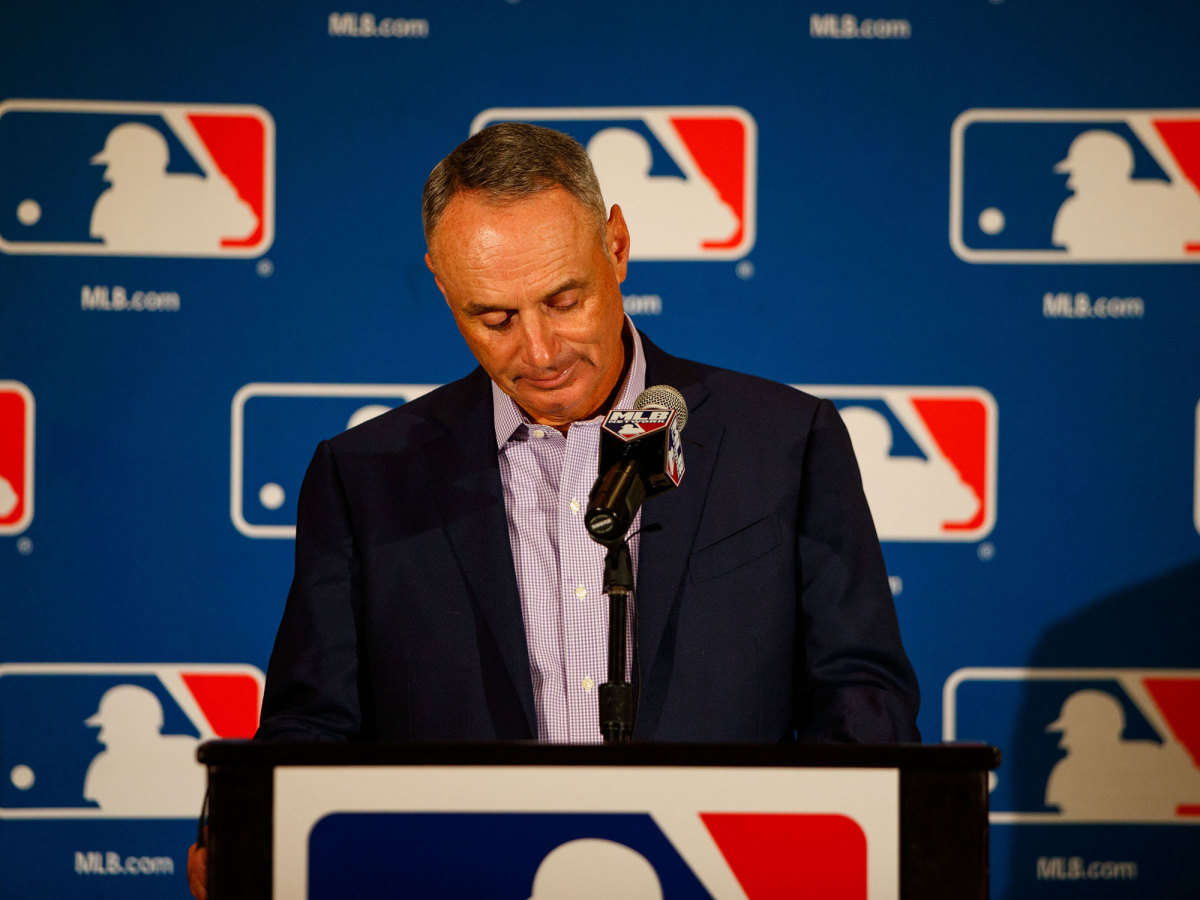MLB's Disaster Offers a Warning to Other Returning Sports
Major League Baseball’s cardboard-cutout commissioner, Rob Manfred, has alienated his players, their union, and longtime fans, so he was always unlikely to make peace with a virus. Manfred might be smart. He might work hard. He can surely speak intelligently about many baseball-related topics for hours. Well, so can a lot of dentists. This doesn’t mean they can run the sport.
Manfred’s job requires long-term vision, thick skin, emotional intelligence–and, in 2020, the ability to create a plan, in concert with the union, to an unprecedented threat to the season. Manfred failed. This was clear weeks ago. What you see now–players testing positive, games being postponed, the rest of the season in peril–is just the coronavirus handing Manfred the bill.
The sport has no bubble. It has a plan, but not a very good one. It is filled with small details, but lacks a large, coherent strategy. The season is coming apart after four days. If you are surprised, raise your hand.
Hi, Rob.
It is increasingly likely that there will be no World Series, though Manfred might just put a guy on second base and claim it’s the World Series. And look: There might be no NBA Finals or Stanley Cup Finals either. But so far, the NBA and NHL bubbles are working. The NHL just announced that it performed 4,256 tests on more than 800 players and had zero positives. The NBA had zero positive tests after one week in the bubble.
If the hockey and hoops bubbles burst, which is entirely possible, then at least there were bubbles. We can reasonably say that the commissioners gave themselves the best possible chance to finish the season. Nobody can say that about baseball.
The looming question, then: Who is watching baseball set itself on fire, and what are they learning? This means you, Roger Goodell. And it means you … uh … (searches for somebody in charge of college football and basketball, finds a list of committees, pokes self in eye).

It is hard to imagine an American autumn without college football. But it’s hard to imagine this autumn with college football. There are too many teams, too many college students, too few protections, too much that can go wrong. Every measure feels like a half-measure.
Maybe a few schools are located away from hotspots, and have smart plans and disciplined players and universities that is basically locked down. But how many, really? The entire sport is a social gathering. If we are counting on thousands of college students–unpaid labor at low risk of dying from COVID-19–to form hundreds of airtight bubbles, we are fooling ourselves.
The NFL, meanwhile, will surely march forward, create rigorous protocols, and–because it is the NFL–believe completely in its infallibility. But the virus does not have Sunday Ticket. Baseball players are far more likely to scratch themselves than make contact with an opponent; if the virus is spreading from baseball team to baseball team, as it might have from between the Marlins and Braves, then what chance do football players have?
Thirty-two football teams traveling around the country for four months is a bold endeavor. I hope it works. I’m not betting on it. Goodell has very little time to adjust his league’s plan, to make sure he is doing what Gary Bettman and Adam Silver did: To work with the union and give his league the best chance to succeed.
Everybody should pay attention. The NFL is at risk. Every college sport season is in doubt. The International Olympic Committee should be planning for extended quarantines and bubbles in Japan next summer for the 2020-ish Olympic Games. The U.S. Olympic Committee should be considering radical new ways to hold its trials. They have time to plan for that. They will have no excuse if they fail.
America has responded to COVID-19 like a lazy science student: study the textbook for a little while, then get bored and wing it. The mixture of impatience and cockiness has cost thousands of lives. The country has tricked itself into a false dilemma: We either save the economy or fight the virus. But the best way to save the economy was to fight the virus. If we had done this properly and stuck with it, we would be in much better shape now.
The NBA and NHL realized they had to do this properly and stick with it. “America needs the games” is not a strategy. It’s what talk-show hosts say between commercials. Baseball moved forward with more confidence than intelligence.
Rob Manfred had a plan. Maybe he can read it to himself in October, when he has nothing else to do.
